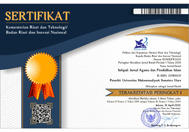Strengthening The Literacy Culture Of Reading The Yellow Book At The Darus Salam Dringu Islamic Boarding School, Probolinggo District
Abstract
This study discusses the strengthening of literacy culture in reading yellow books through the Sorogan method at the Darus Salam Dringu Islamic Boarding School, Probolinggo Regency. Yellow books as classical Islamic books have an important role in Islamic boarding school education. However, students' interest in literacy towards these books is still low. This study uses a qualitative approach with a case study method to identify effective strategies in strengthening literacy culture in Islamic boarding schools. The results of the study indicate that the Sorogan method, which involves direct interaction between students and teachers, is effective in improving students' understanding of yellow books. In addition, routine reading activities 15 minutes before learning, additional discussion sessions, and the provision of adequate library facilities also support increased literacy interest. However, this study also identifies challenges faced, such as limited access to technology and variations in students' abilities in understanding yellow books. The results of this study indicate that the Darus Salam Dringu Islamic Boarding School has succeeded in implementing several significant literacy strengthening strategies, although further efforts are still needed to overcome existing obstacles. Overall, this study offers a new perspective on the implementation of yellow book literacy in Islamic boarding schools, showing that innovative learning strategies and strengthening facilities can support the development of intellectual abilities and character of students in accordance with Islamic teachings.
Keywords
Full Text:
PDFReferences
Anggraeni, D., & Karnubi, K. (2023). Religious Literacy in Learning Fiqh based on the Sorogan Method. Edumasa: Jurnal Pendidikan Islam, 1(April), 44–54. http://edumasa.staima.ac.id/index.php/EduMasa/article/view/10%0Ahttp://edumasa.staima.ac.id/index.php/EduMasa/article/download/10/10
Apdoludin, A., & Martinisyamin, M. (2022). Analisis Pemodelan, Temuan, Pengembangan, Pengorganisasian Materi dan Pembelajaran Bagi Santri di Pondok Pesantren. Jurnal Pendidikan Islam, 8(1), 25–36. https://doi.org/10.15575/jpi.v8i1.15277
Arifin, Z., Namira, S., K, M., Engkizar, E., Asril, Z., & Rahawarin, Y. (2023). The Problems of Students and Teachers in I’rab Learning at Islamic Boarding School. Istawa : Jurnal Pendidikan Islam, 7(2), 144–173. https://doi.org/10.24269/ijpi.v7i2.4587
Aulia, I., & Antariksa, W. F. (2022). Manajemen Pembelajaran Kitab Kuning di Sekolah Tinggi Kitab Kuning. Ar-Rosikhun: Jurnal Manajemen Pendidikan Islam, 1(3). https://doi.org/10.18860/rosikhun.v1i3.17121
Fitriyah, L. (2019). Pendidikan Literasi pada Pembelajaran Kitab Kuning di Pondok Pesantren Nurul Huda Sukaraja. Jurnal Ilmiah Multi Sciences, 11(1), 20–30.
Fitriyah, L., Marlina, M., & Suryani, S. (2019). Pendidikan Literasi pada Pembelajaran Kitab Kuning di Pondok Pesantren Nurul Huda Sukaraja. Titian Ilmu: Jurnal Ilmiah Multi Sciences, 11(1), 20–30. https://doi.org/10.30599/jti.v11i1.351
Garner, S., & Neal, V. (2022). Pedagogical Strategies for Enhancing the Outcomes of Weekly Readings. Proceedings of the Canadian Engineering Education Association (CEEA). https://doi.org/10.24908/pceea.vi.15912
Hairul Huda, Siti Nursyamsiyah, & Bahar Agus Setiawan. (2023). The Quality of Learning in Mu’adalah Boarding School. Jurnal Pendidikan Islam Indonesia, 7(1), 1–11. https://doi.org/10.35316/jpii.v7i1.461
Haruta, J., Oishi, A., & Den, N. (2020). How and what do laypeople learn about end-of-life care using narrative? A case study in educational research. The Asia Pacific Scholar, 5(1), 16–24. https://doi.org/10.29060/TAPS.2020-5-1/OA2126
Haryono, A., Ariefianto, L., Supardi, S., Suryaningtiyas, I. B., Hani, E. S., & Iqbal, M. (2019). Pengungkapan Potensi Budaya dan Kewirausahaan: Upaya Meminimalkan Pengangguran Lulusan Pondok Pesantren Salaf di Kawasan Tapal Kuda Jawa Timur Indonesia. KARSA: Journal of Social and Islamic Culture, 27(2), 234–265. https://doi.org/10.19105/karsa.v27i2.2094
Li, Y., & Guo, Y. (2021). Research on the Strategy of Smart Classroom Construction Based on Teachers’ Data Literacy. SHS Web of Conferences, 123, 01017. https://doi.org/10.1051/shsconf/202112301017
Mawardi, K., & Sartika, E. (2023). Literacy Activities at Islamic Boarding Schools in Banyumas Regency in the Perspective of Gordon Wells. International Journal of Social Science and Religion (IJSSR), 41–60. https://doi.org/10.53639/ijssr.v4i1.136
Morcom, L. A. (2021). “Wiinge chi-baapinizi geniin ode: It really makes my heart laugh”: Language, culture, identity, and urban language revitalization. WINHEC: International Journal of Indigenous Education Scholarship, 1. https://doi.org/10.18357/wj1202120286
Najib, A. A. (2020). Peran Ustadz dalam Membimbing Mental Santri Membentuk Kepribadian Islam di Pondok Pesantren an-Najah Kudus. Islamic Counseling: Jurnal Bimbingan Konseling Islam, 4(1), 67. https://doi.org/10.29240/jbk.v4i1.1388
Nisa Fitriani, Syamsul Anam, & Asep Maulana. (2023). Building Literacy of Early Age Students’ Language; Teacher Managerial Competence and Legal-Rational Authority of Boarding School Leaders. Munaddhomah: Jurnal Manajemen Pendidikan Islam, 5(1), 41–50. https://doi.org/10.31538/munaddhomah.v5i1.707
Nuhrodin, N., & Dhina, M. A. (2021). Information Literacy for Santri in Islamic Boarding School (Pesantren). Al-Hayat Journal of Islamic Education, 5(2), 216. https://doi.org/10.35723/ajie.v5i2.191
Nur, M., Najib, A., Wahyuni, F., Rizky Mustikasari, B., Silvia Rahayu, A., & Muflihatusyawal, E. (2022). Mitigasi Kekerasan Seksual Berbasis Kajian Kitab Kuning di Pondok Pesantren. International Journal Pedagogy of Social Studies, 7(2), 79–86. https://doi.org/10.17509/ijposs.v7i2.52389
Rahayuningsih, S., Setiawan, A., Warisno, A., Andari, A. A., & Anshori, M. A. (2023). The Importance of Kyai Charismatic Leadership in the Formation of Akhlakul Karimah. JMKSP (Jurnal Manajemen, Kepemimpinan, Dan Supervisi Pendidikan), 8(2), 461–471. https://doi.org/10.31851/jmksp.v8i2.11227
Rahmatul Aziz Al Mursyidin, & Hakim, A. M. (2023). Striking Pedagogical Equilibrium: Tailoring Teaching Approaches To Mitigate Student Burnout In Islamic Boarding School Management. Managere: Indonesian Journal of Educational Management, 5(1), 90–100. https://doi.org/10.52627/managere.v5i1.336
Sholeh, M. I. (2023). Technology Integration in Islamic Education: Policy Framework and Adoption Challenges. Journal of Modern Islamic Studies and Civilization, 1(02), 82–100. https://doi.org/10.59653/jmisc.v1i02.155
Sidin, S. A. (2021). The Application of Reward and Punishment in Teaching Adolescents. https://doi.org/10.2991/assehr.k.210325.045
Sirad, M. C., Rusyadi, R., & Choiruddin, C. (2023). Penerapan Metode Formula Utawi Iki-Iku (Simbol Pegon) pada Mata Kuliah Sintaksis Dasar di Perguruan Tinggi Islam. Arabiyatuna: Jurnal Bahasa Arab, 7(1 May), 299. https://doi.org/10.29240/jba.v7i1.6465
Smith, F., Hardman, F., Wall, K., & Mroz, M. (2004). Interactive whole class teaching in the National Literacy and Numercy Strategies. British Educational Research Journal, 30(3), 395–411. https://doi.org/10.1080/01411920410001689706
Spooner, F., Kemp-Inman, A., Ahlgrim-Delzell, L., Wood, L., & Ley Davis, L. (2015). Generalization of Literacy Skills Through Portable Technology for Students With Severe Disabilities. Research and Practice for Persons with Severe Disabilities, 40(1), 52–70. https://doi.org/10.1177/1540796915586190
Subagja, S., Rubini, B., & Pursitasari, I. D. (2022). Student Needs Analysis of the Scientific Literacy Oriented Interactive Multimedia on Living Cells Matter. International Journal of Biology Education Towards Sustainable Development, 2(1), 1–11. https://doi.org/10.53889/ijbetsd.v2i1.116
Tabroni, I., Naufal Irsyadi, A., Kartiko, A., Rutumalessy, M., & Dessye Parinussa, J. (2022). The Arabic Language as A Basic Epistem in The Scientific Tradition of Islamic Boarding School Education. International Journal of Educational Research & Social Sciences, 3(6), 2318–2324. https://doi.org/10.51601/ijersc.v3i6.564
Tan, H. S. (2023). Critical Reading Skills in English of Incoming Grade 10 Learners: An Analysis and Interpretation. International Journal of Multidisciplinary: Applied Business and Education Research, 4(10), 3766–3776. https://doi.org/10.11594/ijmaber.04.10.27
Waruwu, M. (2023). Pendekatan Penelitian Pendidikan: Metode Penelitian Kualitatif, Metode Penelitian Kuantitatif dan Metode Penelitian Kombinasi (Mixed Method). Jurnal Pendidikan Tambusai , 7(1), 2896–2910.
Yozi, S., Khairat, A., & Admalinda, A. (2023). The Yellow Book-Based Fikih Learning Method at the Waratsatul Anbiya Islamic Boarding School. Journal of Multidisciplinary Science: MIKAILALSYS, 1(1), 21–35. https://doi.org/10.58578/mikailalsys.v1i1.1036
Zhang, X., & Tahir, S. (2023).Leveraging Technology To Enhance Access To Quality Legal Education In Malaysia. International Journal of Social Science and Business Management, 1(02). https://doi.org/10.59021/ijssbm.v1i02.46
DOI: https://doi.org/10.30596/20981
Refbacks
- There are currently no refbacks.
Intiqad Jurnal Agama dan Pendidikan Islam is abstracting & indexing in the following databases:
View My StatsEditorial Address:
Faculty of Islamic Religion, Universitas Muhammadiyah Sumatera Utara. Jl. Mukhtar Basri No. 3 Medan 20238 Telp. (061) 6622400 ext. 27 dan 28 Fax. (061) 6625474. e-mail: intiqad@umsu.ac.id

_(1).png)























